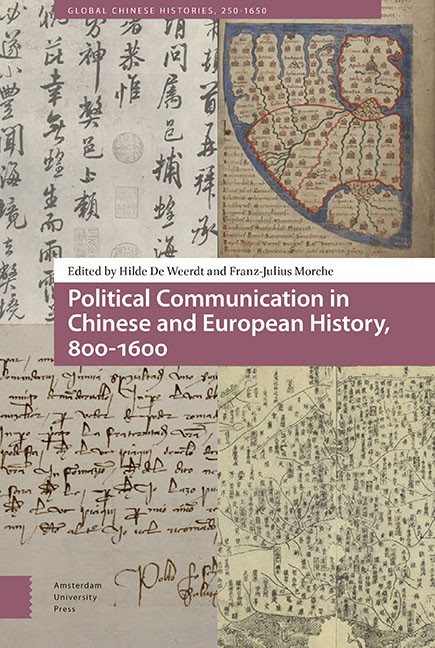Book contents
- Frontmatter
- Dedication
- Contents
- List of Figures and Tables by Chapter
- Acknowledgments
- Introduction
- Part I Communication and the Formation of Polities
- Part II Letters and Political Languages
- Part III Communication and Political Authority
- Part IV Memory and Political Imaginaries
- Epilogues
- List of Contributors
- Index
11 - Yue Fei and Thomas Becket: Elite Masculinities in Comparison
Published online by Cambridge University Press: 17 June 2021
- Frontmatter
- Dedication
- Contents
- List of Figures and Tables by Chapter
- Acknowledgments
- Introduction
- Part I Communication and the Formation of Polities
- Part II Letters and Political Languages
- Part III Communication and Political Authority
- Part IV Memory and Political Imaginaries
- Epilogues
- List of Contributors
- Index
Summary
Abstract
This chapter takes as its starting point the gendered nature of political communications. It uses as case studies the careers — and subsequent reputations — of two twelfth-century figures: the Southern Song general Yue Fei (d. 1142), and the Angevin minister and churchman Thomas Becket (d. 1170). Both rose from relatively humble beginnings to become powerful men, and both met violent deaths at the hands of rivals within the elite. Posthumously, they were both celebrated for specifically masculine virtues in their respective cultures. This micro-comparative study deploys the traditional Chinese dichotomy between wen (civil, cerebral) and wu (military, physical) expressions of manhood to explore the masculinities at play in their careers, their homosociality, and their reputations.
Keywords: Yue Fei, Thomas Becket, masculinity, literati, wen/ wu
Thinking about political communication in China and Latin Europe during the Middle Ages inevitably entails notions of masculinity. It is easy to take for granted that both political cultures were intensely patriarchal, but to understand this in historical terms — rather than as a product of biology or ‘human nature’ — we will take specific phenomena as our starting point, namely the cases of Yue Fei and Thomas Becket.
It is only in the last generation that masculinity has received systematic attention from historians. As far as we are aware, ours is the first attempt to compare elite masculinities in China and Latin Europe during the Middle Ages. The main danger in a project addressing such a fundamental element of these societies (apart from hubris) is being overwhelmed by data. We have therefore adopted a ‘micro-comparative’ approach, based on two case studies. This draws on Carlo Ginzburg's methodology of using spie (keyholes) or clues, in order to diagnose past societies. This notion has been pursued in an explicitly comparative direction by Chris Wickham, who argues that ‘if we want to compare across different societies, a good way to do it is by taking spie which are sufficiently similar in each society that they are comparable […] but which articulate with the other elements of each society in different ways, which are themselves illuminating’. While Ginzburg is most characteristically concerned with quotidian experience, and Wickham's interest is in comparing economic and political change, this chapter addresses cultural phenomena. We explore elite masculinities by peering through two spie: the deaths and subsequent reputations of Yue Fei 岳飛 (d. 1142) and Thomas Becket (d. 1170).
- Type
- Chapter
- Information
- Publisher: Amsterdam University PressPrint publication year: 2021



